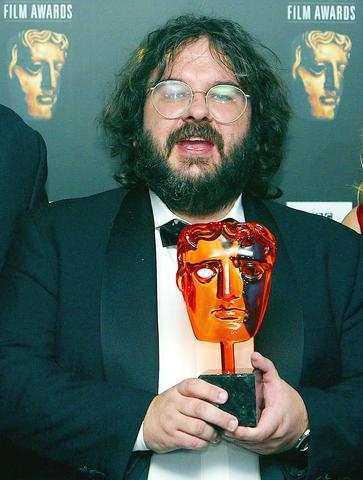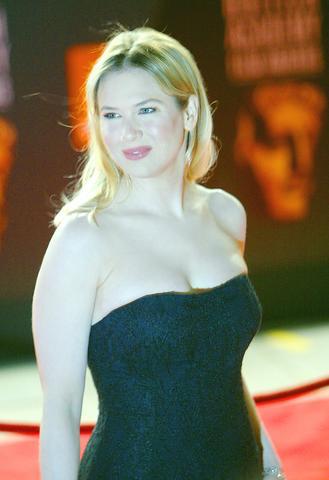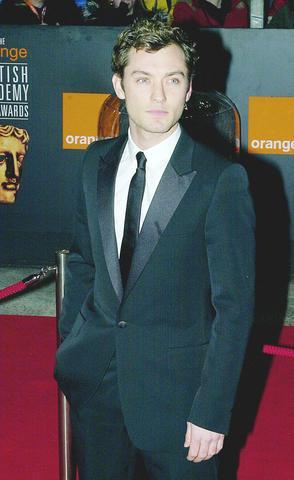The Lord of the Rings: The Return of the King won five trophies, including best film, at the Orange British Academy of Film and Television Arts Awards on Sunday, continuing the fantasy epic's seemingly unstoppable march toward Oscar victory at the end of the month.
In accepting the top prize, an exultant Peter Jackson, The Lord of the Rings' New Zealand-born director, honored the movie's British source in novelist J.R.R. Tolkien.

PHOTO: REUTERS
"We were a bunch of Kiwis and some Australians" who brought to the screen "one of Britain's most beloved books -- a fantastic property," Jackson said.

PHOTO: AFP
Return of the King was nominated for 12 of the awards, known as BAFTAs; it also won best cinematography, adapted screenplay and special effects, as well as the film of the year award, voted by members of the public.
It beat Anthony Minghella's Civil War saga Cold Mountain, Sofia Coppola's quirky Lost In Translation, Tim Burton's whimsical Big Fish and Peter Weir's seafaring saga Master and Commander: The Far Side of the World to take the best-film prize.

PHOTO: AFP
Master and Commander won four trophies, including best director for its Australian director, Weir.
Adding to the internationalism of a ceremony that is often seen to favor British nominees, best actor and actress went to the two American stars of Lost In Translation: Bill Murray, who is up for an Oscar for the same performance on Feb. 29, and Scarlett Johansson.
Johansson thanked the British Academy "for acknowledging ... a 19-year-old American actress." She went on to thank her mother, Melanie, for "taking me to auditions and buying me hot dogs afterwards."
Murray was one of several major winners who were not present to accept their awards. Murray's faxed acceptance speech was read out by writer-director Coppola, who blushed visibly at the glowing tributes paid to her.
Oscar frontrunner Renee Zellweger was named best supporting actress for her role as farmhand Ruby in Cold Mountain, which won a second award for its music -- its only prizes from 13 nominations.
Among the more popular winners was Englishman Bill Nighy, named best supporting actor for his amiably dissolute rock star in Love Actually.
"You've made an old rocker very happy," Nighy told the black-tie audience at a movie theater in London's Leicester Square. "I can't wait to tell the band."
As usual, the awards were a mixture of the predictable and the utterly surprising. Among the latter was American writer-director Tom McCarthy, who won best original screenplay for the little-seen independent American film "The Station Agent."
"I'm beyond stunned," said McCarthy. "Our movie doesn't even open (in Britain) until March."
The British awards have become an essential pre-Oscars stop since they were moved in 2000 from April to a February date preceding the Academy Awards.
But although many regard the BAFTAs as an Oscar bellwether, it's hard to make that claim in a year in which several BAFTA winners -- including Johansson, McCarthy and Lord of the Rings cinematographer Andrew Lesnie -- are not up for Oscars.
The prize for best British film went to Touching the Void, Kevin Macdonald's powerful film about an ill-fated mountaineering expedition. It was the first time this prize has gone to a documentary.
The award for best film not in the English language went to English director Michael Winterbottom's In This World, the wrenching story of two Afghan refugees and their harrowing attempt to make it across Asia and Europe into England.
Emily Young, writer-director of Kiss of Life, won a special achievement award for a first-time filmmaker.
The Fellowship of the Academy, a special award and BAFTA's highest honor, went to John Boorman, the director of Deliverance, Point Blank, and Hope and Glory. Boorman received the night's sole standing ovation.
The ceremony was hosted by Stephen Fry, the erudite English actor/writer/director who made a few gentle jabs at the fact that his own film, the Evelyn Waugh adaptation Bright Young Things, was overlooked in the BAFTA nominations.
Kicking things off, he joked that it was "a record year for the colon" with the appearance of The Lord of the Rings: The Return of the King, Master and Commander: The Far Side of the World, and Pirates of the Caribbean: The Curse of the Black Pearl, among the 2003 releases.
The ceremony was sprinkled with Hollywood stars, including Zellweger, Johansson, Holly Hunter and Johnny Depp, who arrived late and made a last-minute dash up the red carpet.
The awards are sponsored by the cell phone company Orange.

On April 26, The Lancet published a letter from two doctors at Taichung-based China Medical University Hospital (CMUH) warning that “Taiwan’s Health Care System is on the Brink of Collapse.” The authors said that “Years of policy inaction and mismanagement of resources have led to the National Health Insurance system operating under unsustainable conditions.” The pushback was immediate. Errors in the paper were quickly identified and publicized, to discredit the authors (the hospital apologized). CNA reported that CMUH said the letter described Taiwan in 2021 as having 62 nurses per 10,000 people, when the correct number was 78 nurses per 10,000

As we live longer, our risk of cognitive impairment is increasing. How can we delay the onset of symptoms? Do we have to give up every indulgence or can small changes make a difference? We asked neurologists for tips on how to keep our brains healthy for life. TAKE CARE OF YOUR HEALTH “All of the sensible things that apply to bodily health apply to brain health,” says Suzanne O’Sullivan, a consultant in neurology at the National Hospital for Neurology and Neurosurgery in London, and the author of The Age of Diagnosis. “When you’re 20, you can get away with absolute

May 5 to May 11 What started out as friction between Taiwanese students at Taichung First High School and a Japanese head cook escalated dramatically over the first two weeks of May 1927. It began on April 30 when the cook’s wife knew that lotus starch used in that night’s dinner had rat feces in it, but failed to inform staff until the meal was already prepared. The students believed that her silence was intentional, and filed a complaint. The school’s Japanese administrators sided with the cook’s family, dismissing the students as troublemakers and clamping down on their freedoms — with

As Donald Trump’s executive order in March led to the shuttering of Voice of America (VOA) — the global broadcaster whose roots date back to the fight against Nazi propaganda — he quickly attracted support from figures not used to aligning themselves with any US administration. Trump had ordered the US Agency for Global Media, the federal agency that funds VOA and other groups promoting independent journalism overseas, to be “eliminated to the maximum extent consistent with applicable law.” The decision suddenly halted programming in 49 languages to more than 425 million people. In Moscow, Margarita Simonyan, the hardline editor-in-chief of the